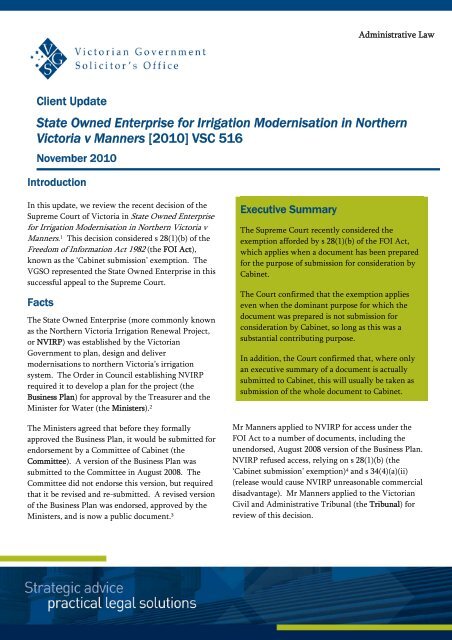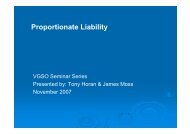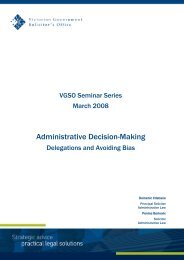Admin Law Newsletter.pdf - Victorian Government Solicitor's Office
Admin Law Newsletter.pdf - Victorian Government Solicitor's Office
Admin Law Newsletter.pdf - Victorian Government Solicitor's Office
- No tags were found...
Create successful ePaper yourself
Turn your PDF publications into a flip-book with our unique Google optimized e-Paper software.
Human Rights<strong>Admin</strong>istrative <strong>Law</strong>Client UpdateState Owned Enterprise for Irrigation Modernisation in NorthernVictoria v Manners [2010] VSC 516November 2010IntroductionIn this update, we review the recent decision of theSupreme Court of Victoria in State Owned Enterprisefor Irrigation Modernisation in Northern Victoria vManners. 1 This decision considered s 28(1)(b) of theFreedom of Information Act 1982 (the FOI Act),known as the ‘Cabinet submission’ exemption. TheVGSO represented the State Owned Enterprise in thissuccessful appeal to the Supreme Court.FactsThe State Owned Enterprise (more commonly knownas the Northern Victoria Irrigation Renewal Project,or NVIRP) was established by the <strong>Victorian</strong><strong>Government</strong> to plan, design and delivermodernisations to northern Victoria’s irrigationsystem. The Order in Council establishing NVIRPrequired it to develop a plan for the project (theBusiness Plan) for approval by the Treasurer and theMinister for Water (the Ministers). 2The Ministers agreed that before they formallyapproved the Business Plan, it would be submitted forendorsement by a Committee of Cabinet (theCommittee). A version of the Business Plan wassubmitted to the Committee in August 2008. TheCommittee did not endorse this version, but requiredthat it be revised and re-submitted. A revised versionof the Business Plan was endorsed, approved by theMinisters, and is now a public document. 3Executive SummaryThe Supreme Court recently considered theexemption afforded by s 28(1)(b) of the FOI Act,which applies when a document has been preparedfor the purpose of submission for consideration byCabinet.The Court confirmed that the exemption applieseven when the dominant purpose for which thedocument was prepared is not submission forconsideration by Cabinet, so long as this was asubstantial contributing purpose.In addition, the Court confirmed that, where onlyan executive summary of a document is actuallysubmitted to Cabinet, this will usually be taken assubmission of the whole document to Cabinet.Mr Manners applied to NVIRP for access under theFOI Act to a number of documents, including theunendorsed, August 2008 version of the Business Plan.NVIRP refused access, relying on s 28(1)(b) (the‘Cabinet submission’ exemption) 4 and s 34(4)(a)(ii)(release would cause NVIRP unreasonable commercialdisadvantage). Mr Manners applied to the <strong>Victorian</strong>Civil and <strong>Admin</strong>istrative Tribunal (the Tribunal) forreview of this decision.
The Tribunal’s decisionSection 28(1)(b)Section 28(1)(b) provides that:A document is an exempt document if it is —a document that has been prepared … for thepurpose of submission for consideration by theCabinet …The Tribunal:1. Decided that whilst it was open to theMinisters to take the Business Plan to theCommittee, it must be presumed that thepurpose for which it was prepared was tocomply with the Order in Council, ie toobtain the Ministers’ approval; 52. Noted that the actual use made of adocument may assist in determining thepurpose for which it was prepared; 63. Found that only the executive summary ofthe Business Plan was in fact submitted tothe Committee, whereas the balance of theBusiness Plan was not; 7 and4. Inferred that a substantial purpose for whichthe executive summary was prepared was forsubmission to the Committee, and that itcame within the s 28(1)(b) exemption.However, the balance of the Business Planwas not so exempt. 8Section 34(4)(a)(ii)Section 34(4)(a)(ii) provides that:A document is an exempt document if itcontains — in the case of an agency engagedin trade or commerce — information of abusiness, commercial or financial nature thatwould if disclosed under this Act be likely toexpose the agency unreasonably todisadvantage …It was common ground that:1. NVIRP was not engaged in trade orcommerce at the time of the originalrequest; 9Page 22. However, NVIRP was engaged in trade orcommerce at the time that the Tribunal madeits review decision; and3. The Business Plan contained information of abusiness, commercial or financial nature. 10The Tribunal decided that:1. The relevant time for assessing whether anagency was engaged in trade or commercewas at the time of the original request, not atthe time of the review decision. 11 As such,NVIRP could not avail itself of s 34(4)(a)(ii);and2. Even if the Tribunal were wrong on thispoint, disclosure of the Business Plan wouldnot expose NVIRP to unreasonablecommercial disadvantage. 12The Supreme Court’s decisionNVIRP appealed to the Supreme Court on sevenquestions of law. 13 The Court (constituted byHargrave J) decided two questions — both in relationto s 28(1)(b) — in favour of NVIRP, with the resultthat it was not open to the Tribunal to find that theBusiness Plan was not exempt from disclosure underthe FOI Act. 14 The Court found it unnecessary toanswer the remaining questions of law. 15 Inparticular, the Court refrained from expressing a viewas to the correctness of the Tribunal’s decision that therelevant time for assessing whether an agency isengaged in trade or commerce (for the purpose ofestablishing the s 34(4)(a)(ii) exemption) is at the timeof the original request.Significantly, the Court:1. Determined that the Tribunal’s finding thatthe sole purpose for which the Business Planwas prepared was for approval by theMinisters, not consideration by theCommittee, was simply not open on theevidence. 16 Although approval by theMinisters was the dominant purpose forwhich the Business Plan was prepared, thisdid not exclude other substantialcontributing purposes, such as submission forconsideration by the Committee; 17
2. Acknowledged as a reality of contemporarygovernment that Cabinet will often beheavily involved in making decisions that arenominally entrusted to an office-holder(eg the Governor or a Minister), stating that:It accords with common sense andexperience that a project involving theexpenditure of $600 million of<strong>Government</strong> funds would beconsidered by Cabinet or a CabinetCommittee before formal approval wasgiven to proceed. 183. Determined that the Tribunal’s finding thatonly the executive summary was submittedto the Committee, but that the balance of theBusiness Plan was not, was simply not openon the evidence; and 194. Held that:where a document is prepared for asubstantial purpose of submission toCabinet for consideration, thepreparation and submission of anexecutive summary of the document,and not the full document, does notalter the purpose for which thedocument was prepared; andsubmission of the executive summaryonly will usually be taken assubmission of the whole document. 20The Court, therefore, allowed NVIRP’s appeal, andaffirmed its original decision that the entire August2008 version of the Business Plan was exempt fromdisclosure under the FOI Act by reason of s 28(1)(b).Key messages for FOI practitionersThis decision reaffirms that:1. A document may still attract the s 28(1)(b)exemption even if its submission forconsideration by Cabinet was not thedominant purpose for which it was prepared.Other, non-Cabinet purposes can bedominant purposes, so long as submission forconsideration by Cabinet is a substantialcontributing purpose;Page 32. The substance of government decisionmakingpractices — and not just their form— is important when considering thepurpose for which a document is prepared.Even though there may be no formal orexpress requirement for a document to besubmitted for consideration by Cabinet,contemporary government practice may bethat Cabinet is still involved in the decisionmakingprocess. As such, a wider range ofdocuments may attract the s 28(1)(b)exemption if there is evidence that they wereprepared for submission for consideration byCabinet; and3. Submission of the executive summary of adocument to Cabinet, rather than the entiredocument, will usually be taken assubmission of the entire document toCabinet. However, this presumption may berebutted by evidence that the balance of thedocument was never intended to besubmitted for consideration by Cabinet, butthe executive summary was a stand-alonedocument that was prepared for thatpurpose.For further informationFor further information or legal advice on anyissues raised in this newsletter contact:Jonathan Smithers Assistant <strong>Victorian</strong><strong>Government</strong> Solicitor9032 3011Joanne Kummrow Managing Principal Solicitor9032 3009Daniel Perkins Senior Solicitor9032 3005Elsie Loh Senior Solicitor9032 3036
Page 41 [2010] VSC 516.2 State Owned Enterprises (State Body — State Owned Enterprise forIrrigation Modernisation in Northern Victoria) Order 2007,published in the Victoria <strong>Government</strong> Gazette, G51 of 2007,p 3199, cl 7(1)(b).3 NVIRP, Business Case for the NVIRP Stage 1, available at4 The exemption also applies to documents prepared for the purposeof submission for consideration by committees and subcommitteesof Cabinet: FOI Act, s 28(7)(a).5 Manners v Northern Victoria Irrigation Renewal Project[2010] VCAT 1053, [36]–[37].6 Ibid [30].7 Manners v Northern Victoria Irrigation Renewal Project[2010] VCAT 1053, [35].8 Ibid [44].9 Ibid [65]–[66].10 Ibid [68].11 Ibid [60].12 Ibid [72].13 The appeal was brought pursuant to the <strong>Victorian</strong> Civil and<strong>Admin</strong>istrative Tribunal Act 1998, s 148(1).14 State Owned Enterprise for Irrigation Modernisation in NorthernVictoria v Manners [2010] VSC 516, [23], [25], [27].15 Ibid [30].16 Ibid [23], [25].17 Ibid [25].18 Ibid [23].19 Ibid [27].20 Ibid [28].








